Key takeaways
- The post explains what white wine vinegar is, how it’s made, and how it’s used in cooking (like sauces, marinades, pickles, and dressings).
- It lists multiple white wine vinegar substitutes (including red wine vinegar, rice vinegar, lemon juice, sherry vinegar, champagne vinegar, and apple cider vinegar).
- It also includes more substitute options (like balsamic, white vinegar, honey vinegar, white wine, fruit vinegar, and herb vinegar) and suggests choosing based on flavor needs.
- It covers storage tips and mentions non-cooking household uses discussed in the post.
Vinegar is used in many dishes to enhance the flavor of the recipes. There are various types of vinegar available in the market with different tastes and used in recipes as per the requirements. If you prefer to make sour dishes, pickles, chutneys, and marinades at home rather than buying it from a shop or a restaurant, then white wine vinegar is one of the vital ingredients that you will need. I know white wine vinegar is rare in anyone's pantry, so in this article, let's have a look at white wine vinegar substitutes that you can use in your recipes without compromising the taste of the dish. Before proceeding with the replacements, here is some information related to white wine vinegar that everyone should know.
What is white wine vinegar?
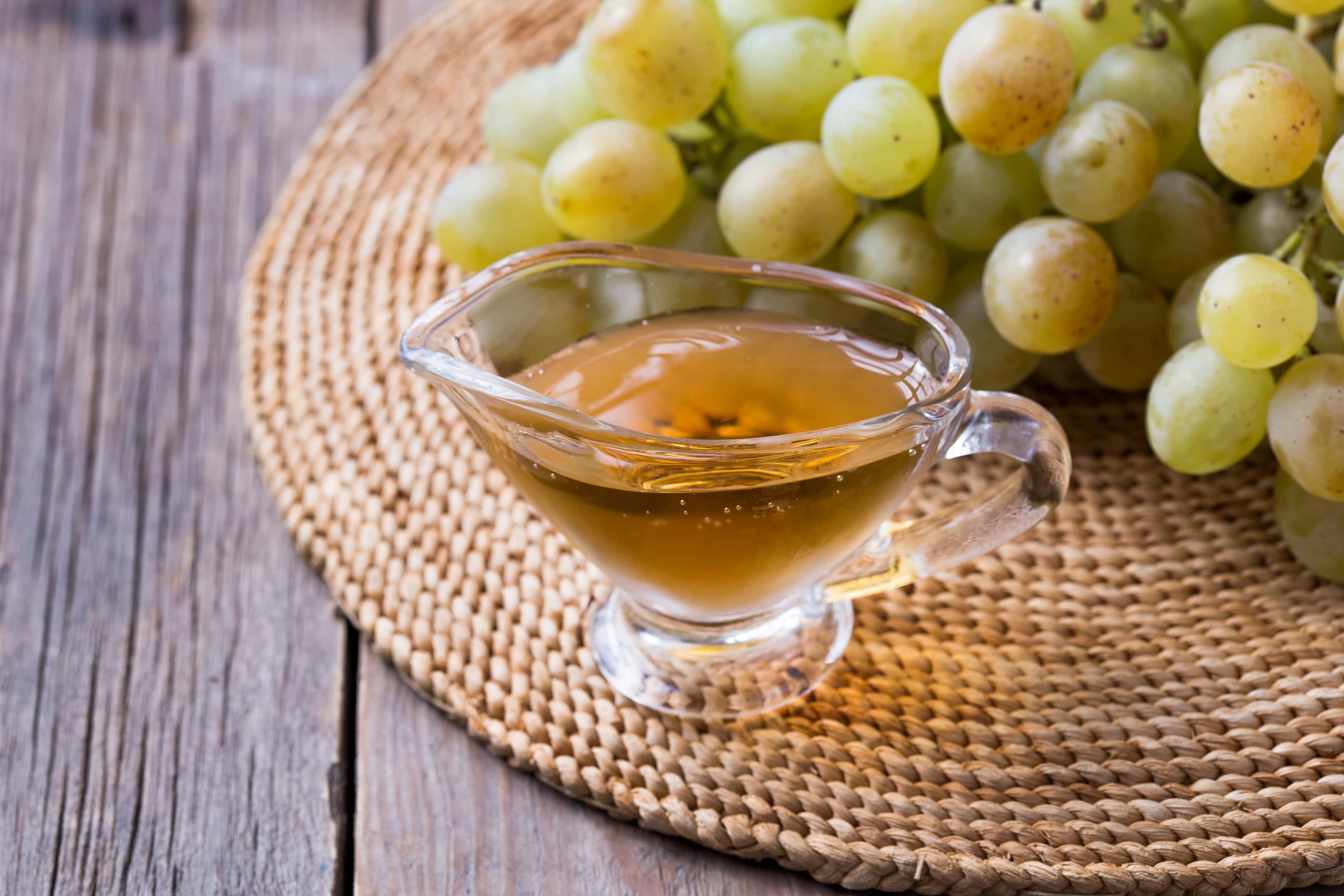
White wine vinegar is manufactured by a complex procedure of fermenting white wine. It obtains the fruity flavor as the fermented white wine is oxidized into acid. Depending on the amount of white wine used in the recipe, the taste of the dish may vary. People mostly use it in French cuisine like soups, stews, and Béarnaise sauces. Some people prefer using this vinegar as it is colorless, and doesn't change the color of the recipe.
How is white wine vinegar made?
Initially, the white wine is fermented and oxidized into an acid. The distilling process usually takes place in a vat known as acetator, which is made up of stainless steel. Later the ethanol in the wine is exposed to oxygen.
As the desired percentage of acidity lies between 5% to 7%, the resulting acetic acid undergoes dilution with the addition of water. Moreover, a blend of wines called the wine stock is used for making the white wine vinegar.
How to use white wine vinegar for cooking?
- Poaching eggs — Incorporate a splash of white wine vinegar into the dish while cooking in the simmering water. It helps the egg white to set to ensure you will be happy to see your uniformly poached egg.
- Baking — Add one to two teaspoons of vinegar to cakes, cookies, or cupcakes so it reacts with the soda. You will find it helpful in making egg-free desserts.
- Cooking rice — Try adding a teaspoon of vinegar while cooking your rice. It will lessen the amount of starch and give you fluffier grains.
- Buttermilk — If you want buttermilk, you can make your own by adding one teaspoon of vinegar to whole milk. Just let it sit for 5 to 10 minutes and you get perfect buttermilk without dropping a sweat.
- Marinades and dressings — It balances the sweetness and enhances the saltiness of the dish. You can also add vinegar as per the amount of the meat.
What are the uses of white wine vinegar in the house?
- Relieve sunburn pain — If you have a sunburn, just prepare an equal proportion solution of distilled vinegar and water, soak it in a cloth and dab it on the affected area. You can also add 2 cups of vinegar to your bathwater.
- All-purpose cleaning solution — Vinegar serves as an excellent cleaning solution. All you need to do is mix some distilled vinegar and water (1:3 proportion) and use it on anything like windows, stovetops, tiles, and much more.
- Clean the coffee maker — To dissolve the oily build-up or the minerals, add distilled vinegar to the carafe and brew it for some time. Later empty the carafe, fill it with clean water and start the brewing process to wash away the vinegar.
- Keep flowers fresh — Add a few tablespoons of vinegar to the water in a flower vase to make the flowers last longer. Do not forget to change the water after the water becomes cloudy.
- Clean your microwave — To get rid of the smell of any food stuck to the microwave, take a microwave-safe cup, and add 1/4 cup of vinegar and one cup of water to it. Set the microwave to a high temperature until the water boils and steam forms on the window. Let it cool down for some time, and then wash the food residue with the tissue or cloth.
- Clean the sink drains — To keep the kitchen drains clean, just pour some vinegar into the drain. You can do it regularly once a week to keep your sink drain from clogging. Let it set down for some time, and then rinse it off with cold water.
How is white wine vinegar stored?
You can store white wine vinegar in a closed container at room temperature. As it is highly acidic, you do not need to worry about any bacterial growth and spoilage. The growth of bacteria continues in unpasteurized vinegar and may develop sediments. However, these sediments are not dangerous in any way, and you can strain them easily. Therefore, refrigerating the unpasteurized vinegar can help to slow this process.
White wine vinegar substitutes

White wine vinegar offers a slightly savory flavor to a dish. Moreover, you can opt for it if you need a light yellow tint for your dish. Therefore, choosing a substitute is quite a tricky process, as each variety of vinegar has its unique taste and flavor.
Here are few white wine vinegar substitutes that you can add to your recipe without compromising its taste.
1. Red wine vinegar
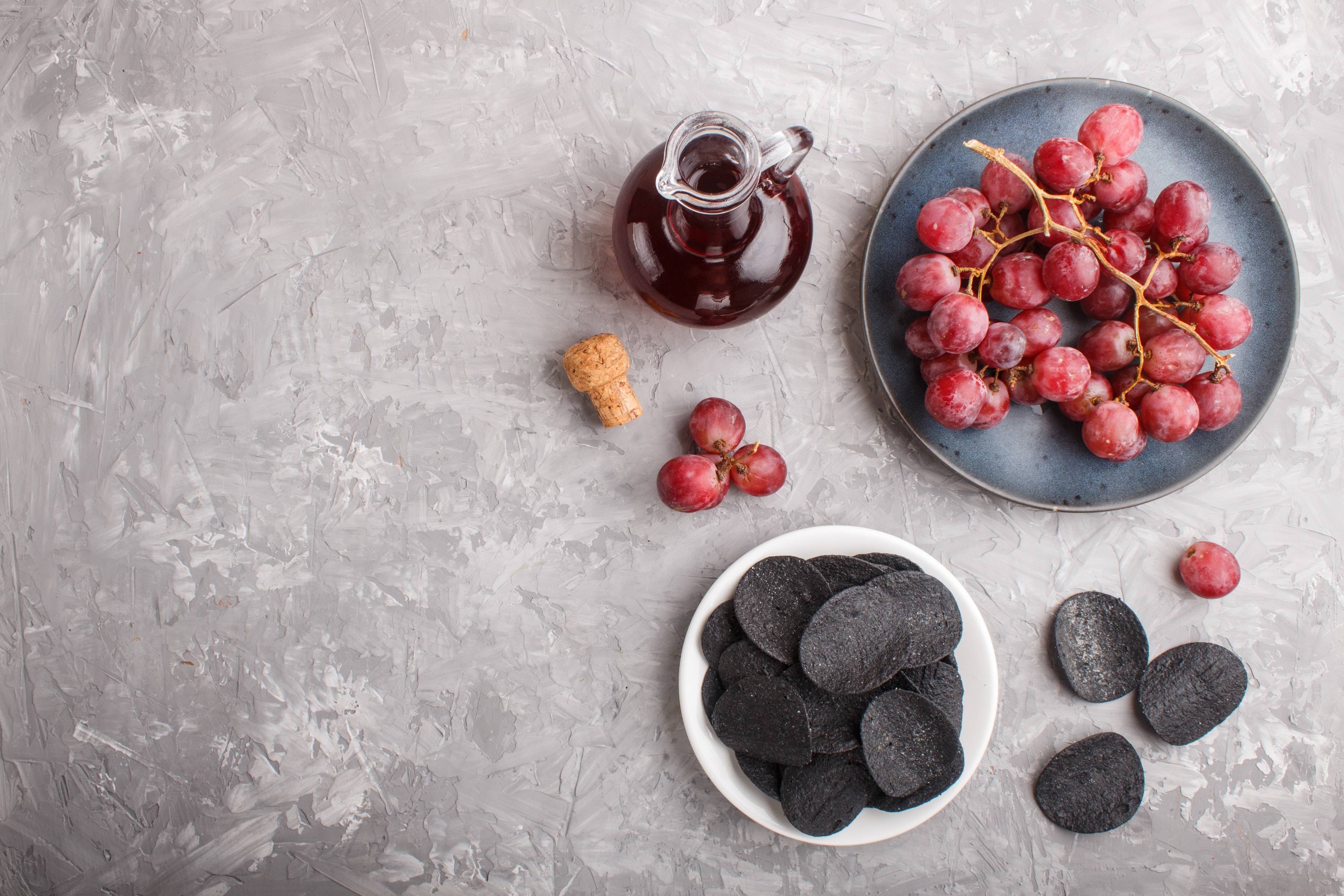
You might have this question in mind—can I use red wine as a substitute for white wine vinegar?
The straight forward answer to your question is yes. White wine vinegar has a similar characteristic as red wine, as both have the same source of manufacturing, i.e. the wine.
However, red wine has a more intense flavor and is more acidic than white wine vinegar. Also, red wine vinegar can add color to your dish, so it goes well with the dark-colored recipes, but not with the light ones. Additionally, you can use red wine vinegar in meat marinades, vinaigrette, pickles, and salads. You can substitute white wine vinegar with red wine vinegar wherever you need sour and tangy flavors in recipes.
You can replace one tablespoon of white wine vinegar with one tablespoon of red wine vinegar to give the same flavor to recipes.
Benefits of red wine vinegar
Red wine vinegar offers the following health benefits.
- Regulates blood pressure
- Helps in proper digestion
- Aids in the absorption of calcium
- Helps to improve skin and hair
- Is rich in healthy nutrients
2. Rice vinegar
Rice vinegar is also an excellent substitute for white wine vinegar. It is prepared by the fermentation and processing of rice; whereas white wine vinegar is manufactured from white wine. Nevertheless, both kinds of vinegar have the same flavor.
Its acidic and light flavor makes it a significant addition to sauces, salad dressings, pickled vegetables, and slaws.
In Asian cuisine, people use it in stir-fry, rice dishes, and soups. Rice vinegar has a mild and slightly sweet flavor as compared to white wine vinegar. Therefore, it should be used in certain recipes.
You can substitute an equal quantity of white wine vinegar with rice vinegar.
Benefits of rice vinegar
Rice vinegar is an effective ingredient for the following health benefits.
- Boosts immunity
- Prevents cardiovascular problems
- Improves digestive health
- Helps in boosting energy levels
- Works as a natural facial toner that offers a glow to the skin
3. Lemon juice

Lemon juice has a sour flavor similar to white wine vinegar, and so it is also one of the best substitutes for it.
Dishes that require a tangy or punchy flavor can make use of lemon to enhance the taste of the recipe. As lemon juice is acidic in taste, you can use it in marinades for meat and salad dressings.
If you want lemon juice to substitute a tablespoon of white vinegar, just mix half spoons of each lemon juice and water and sprinkle it onto your dish.
Benefits of lemon juice
Lemon juice offers the following benefits.
- Improves cardio health and prevents cardiovascular diseases
- Aids in weight loss
- Helps in preventing kidney stones
- Helps to deal with several skin problems
- Effective for treating indigestion
4. Sherry vinegar
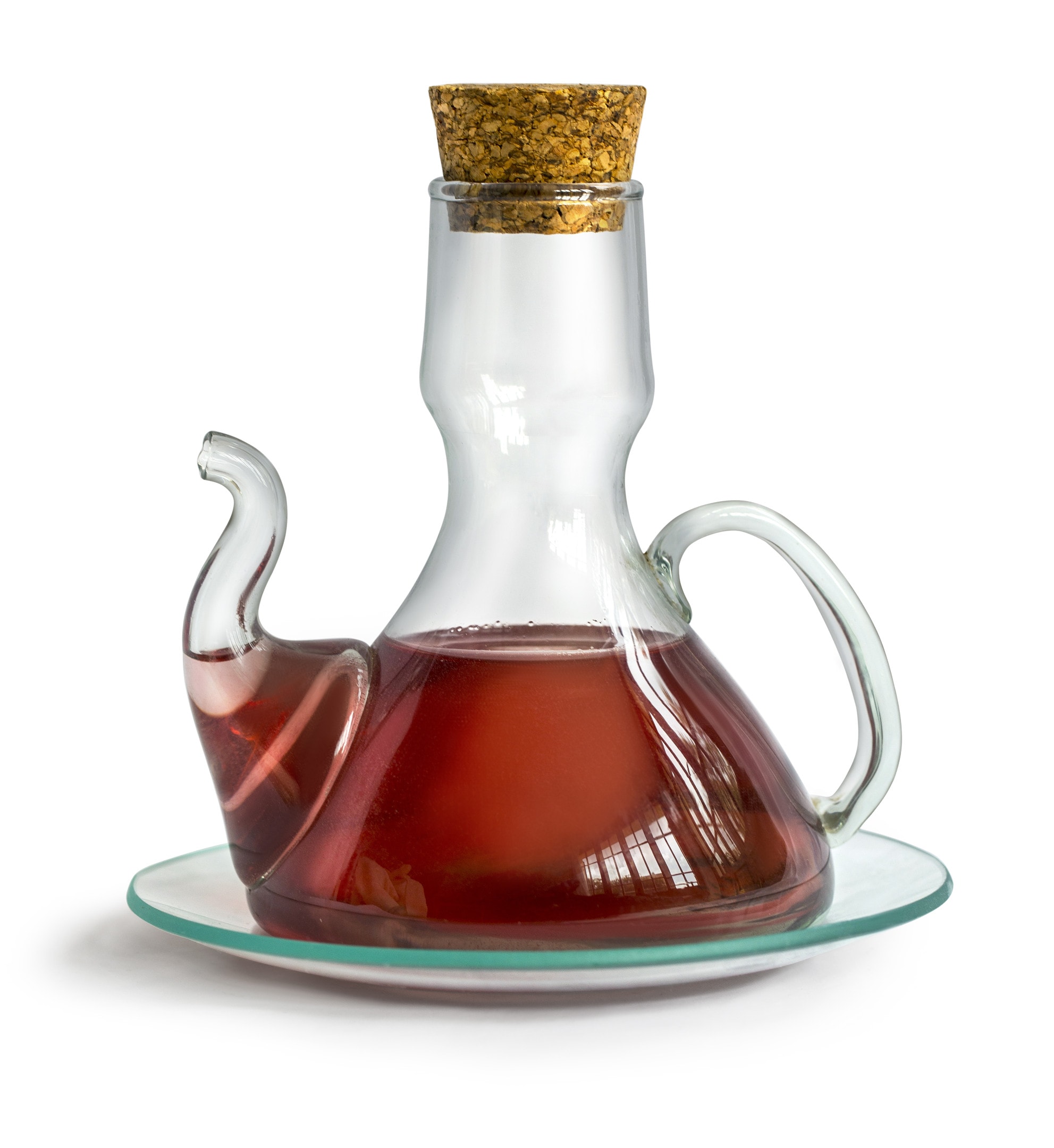
It is also a suitable substitute for white wine vinegar. Sherry vinegar is processed from the Spanish wine sherry. It offers a unique blend of flavors such as sweet, nutty, and caramel. Therefore, it offers a unique taste compared to other kinds of vinegar.
Sherry vinegar that is old has a dark color, and so if you are using it as a substitute for white wine vinegar, you should use the younger and lighter sherry vinegar.
Sherry vinegar is commonly used in salads, glazes, marinades, and sauces owing to its acidic character.
You can substitute one tablespoon of sherry vinegar instead of white wine vinegar in the recipes.
Benefits of sherry vinegar
Sherry vinegar offers the following health benefits.
- Offers a boost to your weight loss journey
- Ensures the proper functioning of the liver
- Effective for lowering blood sugar levels
- Helps to overcome the problems of indigestion
- Increases calcium absorption in the body
5. Champagne vinegar

The manufacture of champagne vinegar revolves around the fermentation and processing of the champagne or juice of wine grapes. You can always count on champagne vinegar for its light and delicate flavor.
Its light acidic taste makes it a suitable substitute for white wine vinegar. Therefore, you can use it in dishes like dips, salad dressings, seafood dishes, and marinades.
Champagne vinegar adds a mild yet distinguishing flavor to your recipes without dominating its presence in the dishes. It is more delicate and lighter than white wine vinegar but is a subtle substitute.
You can add a greater amount of champagne vinegar, say one and a half tablespoon to offer the flavor of one tablespoon of white wine vinegar.
Benefits of champagne vinegar
Champagne vinegar is an excellent choice if you want the following benefits.
- Helps the body to absorb essential nutrients
- Effective in stabilizing the body sugar
- Rich in antioxidants to offer health benefits
- Aids in helping to lose weight
6. Apple cider vinegar
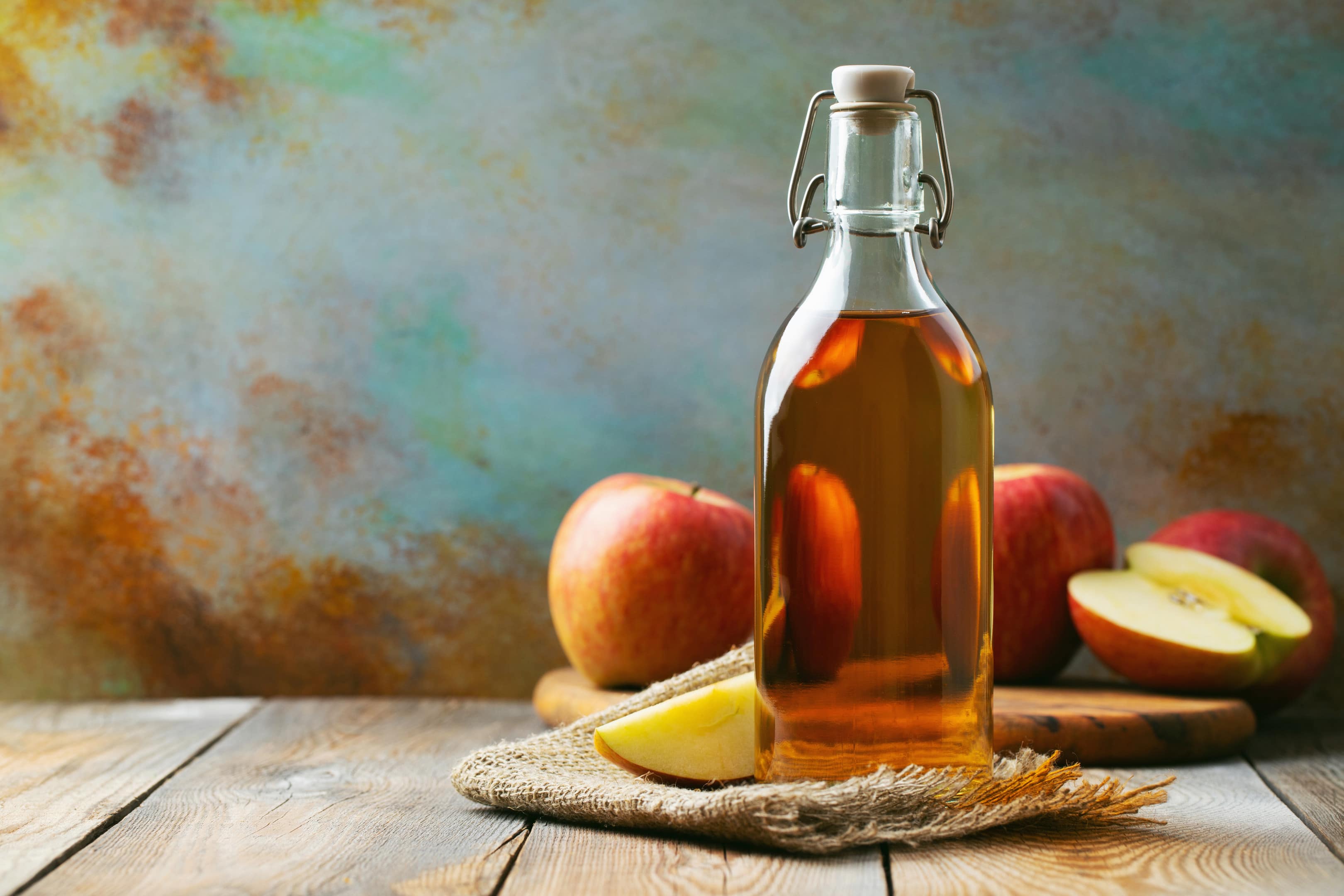
Apple cider vinegar is also an excellent white wine vinegar substitute, and it is manufactured through apple fermentation. It is versatile as it has the tangy flavor of vinegar, the sour flavor of apples, and a slightly sweet flavor.
Its white flavor appearance is a suitable substitute for recipes that require white wine vinegar.
You can make pickles, stews, marinades, and other intensive flavored dishes. However, it doesn't go well with dishes that require a light flavor.
You can use an equal quantity of apple cider vinegar in place of white wine vinegar in recipes.
Benefits of apple cider vinegar
Apple cider vinegar is an easily available white vinegar substitute that offers the following health benefits.
- Antibacterial property helps to prevent any bacterial infestation
- Helps to lower the blood sugar levels and also fight diabetes
- Aids the cholesterol levels in the body to offer you a healthy heart
- Helps in weight loss and also reduces stomach fat
- Can also help to prevent heartburn
7. Balsamic vinegar

Balsamic vinegar is also one of the suitable white wine vinegar substitutes. It is made from grape juice, which is then reduced. Therefore, it contains all the nutrients, vitamins, and minerals from the fruit.
It is an excellent choice for salad dressings, marinades, and other foods that require a distinct flavor.
You can take an equal tablespoon of balsamic vinegar as a replacement for one tablespoon of white wine vinegar in recipes.
Benefits of balsamic vinegar
You can enjoy the following perks if you consume balsamic vinegar.
- Effective in relieving congestion
- Helps to reduce the acid flux
- Aids in treating wounds
- Helps lower high blood pressure levels and hypertension
- Regulates blood sugar levels
8. White vinegar

White vinegar is made by fermenting grain alcohol. Ingredients like yeasts and phosphates are used in the fermenting because the liquor doesn't contain many natural nutrients.
It is very acidic compared to white wine vinegar. Therefore do not forget to dilute it before use. Moreover, you can add a pinch of sugar to get the desired flavor when using it as a white vinegar substitute.
You can use it for making salads, sauces, pickles, and marinades, as it provides similar acidity to white wine vinegar.
To use it as a substitute for one tablespoon of white wine vinegar, you will need to add 3/4 tablespoon of white vinegar, 1/4 tablespoon of water, and little sugar.
Benefits of white vinegar
White vinegar offers the following health benefits.
- Helps in lowering the cholesterol level
- Deals with weight loss aids and thus lowering the chances of obesity
- Lowers the blood sugar and insulin after the meals
- Treats physical ailments on the body
- Has antibacterial and antihypertensive effects
9. Honey vinegar
Honey vinegar is made by fermenting honey into vinegar. It is versatile, and so we can use it in many ways.
It is not only a suitable substitute for white wine vinegar in many recipes but also can boost your cocktails with its unique flavor.
You can use it in salads, dressings, and garnishes as it gives nice acidity and a little bit of sweetness, which is similar to the flavor of white wine vinegar.
You can use one tablespoon of honey vinegar as a replacement for one tablespoon of white wine vinegar.
Benefits of honey vinegar
You can enjoy the following health benefits with honey vinegar.
- Improves digestion
- Helps in nourishing and rejuvenating the skin
- Aids in weight loss
- Prevents stomach ache, fever, and sore throat
10. White wine

White wine is a type of wine manufactured by fermenting white grapes. It is a suitable alcoholic beverage that is commonly incorporated into cooking as well. It is sharp and acidic, but less acidic than white wine vinegar. It has a strong flavor, and so you can use it in making French dishes and sauces; however, it is not suitable for salad dressings.
You can take two tablespoons of white wine as a replacement for one tablespoon of white wine vinegar.
Benefits of white wine
White wine comes with a large number of health benefits.
- Improves cardio health
- Helps to improve the metabolism of the body
- Controls the cholesterol levels in the body
- Improves the functioning of the lungs
- Helps in reducing stress hormones, as is full of antioxidants
- Improves blood circulation in the body
11. Fruit vinegar
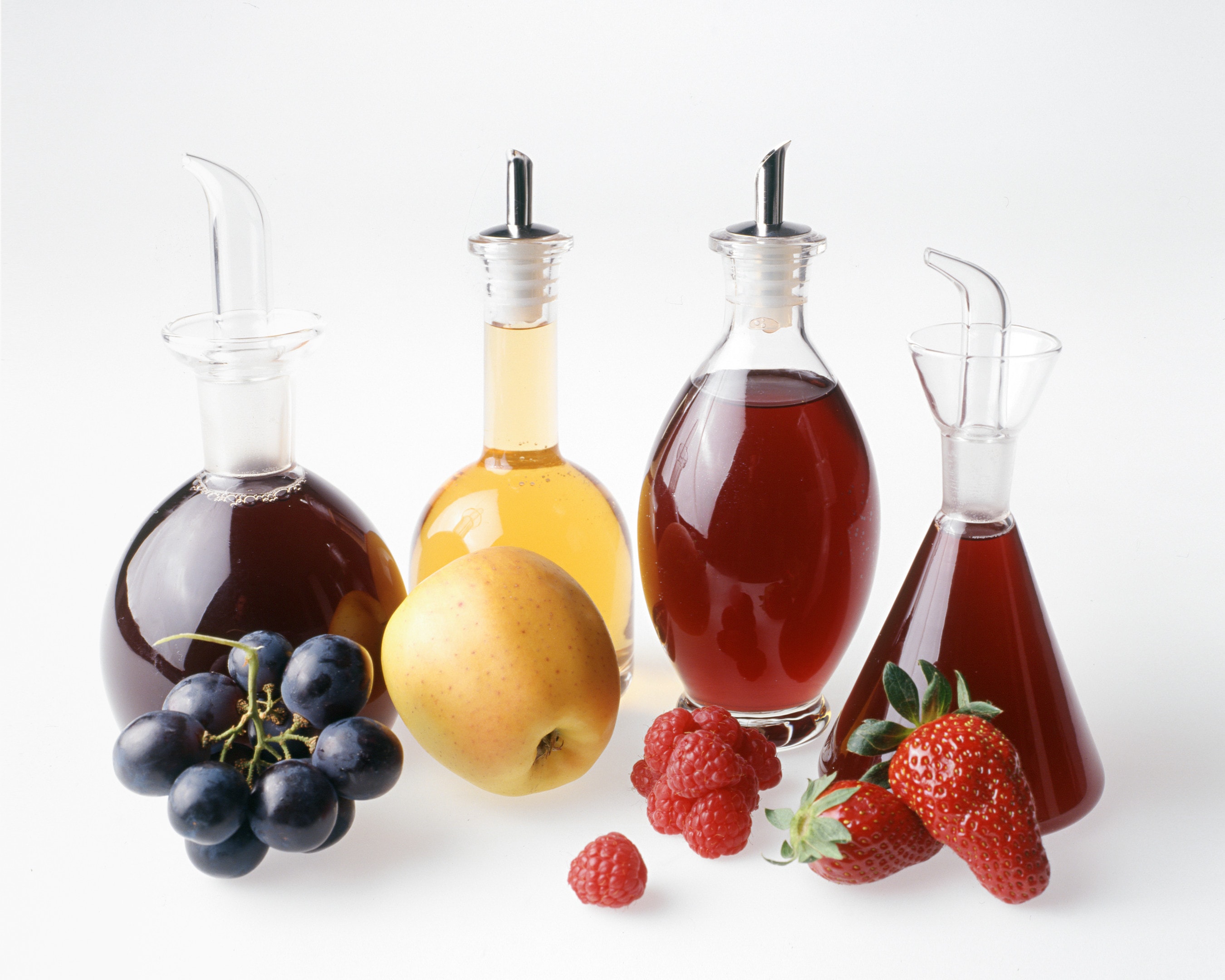
Fruit vinegar is one of the best substitutes for white wine vinegar, as it has a fruity flavor and adds acidity to a dish without overpowering the taste.
Authentic fruit vinegar is processed by the fermentation of fruit juice into wine followed by acidic incorporation.
It is milder than white wine vinegar and has a sweet flavor. Moreover, you can use it in making vinaigrettes.
There is no exact measurement of substituting the fruit vinegar with white wine vinegar. You can add it as per your preference.
Benefits of fruit vinegar
Consumption of fruit vinegar provides you the following advantages.
- Helps in improving memory retention and cognitive functions
- Aids the body to absorb essential nutrients
- Contains antioxidants and anti-inflammatory ingredients
12. Herb vinegar
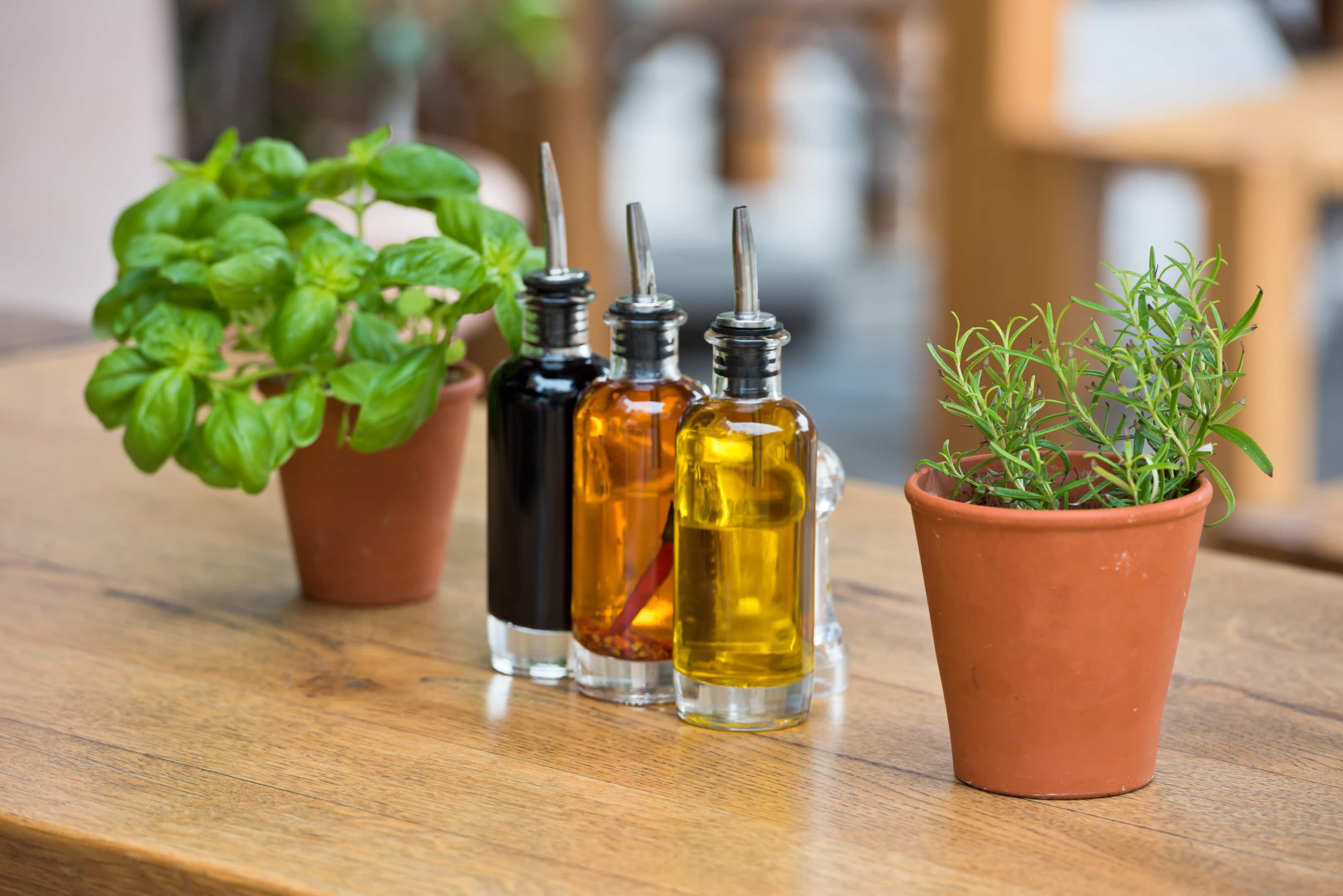
Herb vinegar is prepared using herbs or fruits to provide unusual or unique flavors to the food.
It has a unique flavor that makes it a suitable white wine vinegar substitute for use in salad dressings and sauces. You can consider it to be an aromatic addition to the dishes. Most people prefer to use it in preparing gourmet foods.
Moreover, it can add flavors from sweet, spicy, or acidic to any dish and can enhance its taste.
Benefits of herbs vinegar
Herb vinegar offers you the following perks to improve your health.
- Helps to reduce weight
- Stabilizes the blood sugar levels in the body
- Lowers the cholesterol levels in the body
- Helps to improve digestion
The bottom line
There are many white wine vinegar substitutes available in the market that not only can provide the perfect flavor, but also add similar acidity to your recipe. So, if you need any replacement, you can try any of the substitutes mentioned above.
When using the substitutes, make sure to keep in mind the tangy flavor, sweetness, and level of acidity required in the dish to give the perfect taste to your dish.
If you have tried any of these substitutes, then do share your experience with other readers in the comments section.






